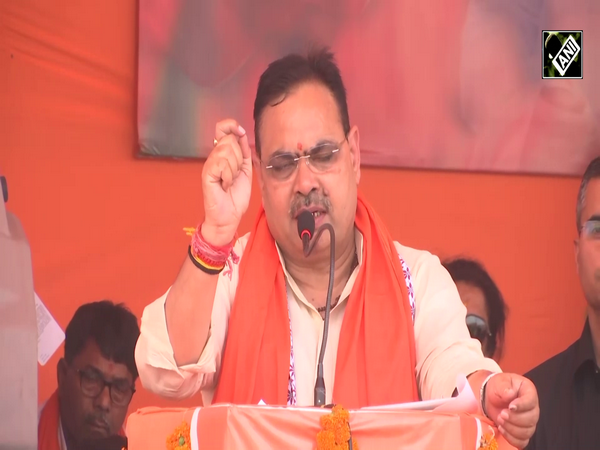PM Modi's state visit to Egypt to foster mutual prosperity, strengthen bilateral ties
Jun 24, 2023

By Maheep
New Delhi [India], June 25 : As Prime Minister Narendra Modi has embarked on his first official state visit to Egypt at the invitation of President Abdel Fattah El-Sisi, the visit serves as an opportune platform to further bolster collaboration and solidify the bond between the two nations, author Maheep writes.
This engagement represents a crucial step towards realizing the shared aspirations of India and Egypt, amplifying the potential for mutually beneficial outcomes in the pursuit of comprehensive cooperation.
The visit of Prime Minister Modi spans two days June 24-25. It comes as a reciprocal gesture following President El-Sisi's presence as the Chief Guest at India's Republic Day celebrations earlier this year. The visit of President El-Sisi to India proved to be highly successful, culminating in both nations mutually agreeing to elevate their relations to the status of a strategic partnership.
Historical, Cultural and Diplomatic Exchanges
The roots of Indo-Egyptian diplomatic relations can be traced back to the 3rd century BC when Indian Emperor Ashoka the Great dispatched his envoys to the court of the Egyptian ruler Ptolemy II Philadelphus. The Egyptian king, in a reciprocal gesture, dispatched his own ambassador named Dionysius to the Mauryan court at Patliputra. This recorded incident marks the earliest known interaction between the two ancient civilizations, laying the foundation of diplomatic engagement between India and Egypt, and highlighting the far-reaching historical ties that have endured through the ages.
In a notable address, the Indian Ambassador to Egypt, Ajit Gupte, emphasized the enduring nature of the maritime connections between India and Egypt. He highlighted that these connections have transcended time, spanning across centuries and leaving an indelible mark on their shared history.
The knowledge of the joint commitment between the two nations to this influential global initiative continues to resonate, symbolizing the shared values, aspirations, and their common pursuit of independent foreign policies in a multipolar world that remains an important and unique aspect of their historical narrative.
Moreover, the cherished bond between Mahatma Gandhi and Saad Zaghloul is still deeply entrenched in the collective memory of the Egyptian people. Notably, the Indian Ambassador underscored the genuine desire of the Egyptian population to foster closer ties with India, owing to their strong affinity for Indian culture and deeply ingrained family values.
Prime Minister Modi's itinerary includes visits to significant historical and cultural sites in Egypt. He will pay homage to the awe-inspiring 11th Century Al-Hakim mosque. This architectural marvel stands as a testament to the rich cultural heritage shared by India and Egypt.
What adds even greater significance to this visit is the remarkable restoration of the Al-Hakim mosque, made possible through the unwavering dedication and support of the Dawoodi Bohra community. The Al-Hakim mosque, with its centuries-old legacy, serves as a beacon of religious and historical importance showcasing the intermingling of Indian and Egyptian cultures. Furthermore, the visit to the Heliopolis War Grave Cemetery pays tribute to Indian soldiers who made supreme sacrifices during the First World War, further reinforcing the historical bond between the two countries.
Prime Minister Modi will interact with the vibrant Indian diaspora residing in Egypt also. This engagement not only fosters people-to-people ties but also provides a platform for the diaspora to contribute to economic growth and cultural exchange between the two nations.
Strengthening Bilateral Ties
The partnership between the two nations has recently ascended to the level of a strategic alliance, encompassing critical domains such as political collaboration, defence cooperation, maritime security, food security, economic integration, and concerted efforts on global affairs. The primacy placed on these multifaceted facets underscores the fundamental importance they hold in shaping and nurturing the bilateral relations between them.
Diplomatic exchanges over the past few months, India and Egypt have witnessed a surge in ministerial-level political exchanges. Notably, key ministers from both countries have visited each other, showcasing the intensified focus on strengthening various aspects of the bilateral relationship.
The visits of Indian Defence Minister Rajnath Singh in September 2022 and External Affairs Minister S Jaishankar in October last year have yielded remarkable outcomes in the realm of defence collaboration between India and Egypt. These visits paved the way for the historic initiation of "Desert Warrior," a joint tactical exercise conducted by the air forces of both nations. Moreover, another bilateral Defence Cooperation was marked by Cyclone 2023, a two-week-long joint exercise conducted by the armies of India and Egypt.
The potential for defence cooperation between Egypt and India has become a prominent focal point of their evolving partnership. Reports have surfaced that India and Egypt are engaged in discussions pertaining to the supply of India's advanced Tejas fighter aircraft to Egypt. This development signifies a momentous landmark, as it not only strengthens the military ties between the two countries but also lays the groundwork for Cairo to foster the growth of its own indigenous defence industry.
In addition to the remarkable co-production of cutting-edge military equipment, the upcoming discussions will delve into a significant proposition put forth by Egypt--an exclusive slot reserved for India within the prestigious Suez Canal Economic Zone. This golden opportunity holds immense promise for advancing their economic collaboration and solidifying India's foothold in the region.
In addition to the remarkable co-production of cutting-edge military equipment, the upcoming discussions between our esteemed nations will delve into a significant proposition put forth by Egypt--an exclusive slot reserved for India within the prestigious Suez Canal Economic Zone. This extraordinary prospect holds immense promise for advancing economic collaboration and solidifying India's foothold in the region.
Furthermore, the realms of green hydrogen and tourism stand as fertile ground for fostering substantial growth and mutual prosperity. Indian investments in these areas possess tremendous potential, offering avenues for innovation, sustainability, and economic vitality. By venturing into the realm of green hydrogen, we can drive the transformation towards a cleaner and more sustainable energy future, while the tourism sector holds immense possibilities for cultural exchange, economic stimulation, and the deepening of people-to-people connections. The convergence of ambitions in these domains holds the power to unlock new horizons of growth, prosperity, and bilateral cooperation.
Economic and Trade Engagement
In a truly extraordinary gesture of goodwill and benevolence, Egypt demonstrated its unwavering support by dispatching three aircraft cargoes laden with a consignment of 300,000 doses of the Remdesivir vaccine. This compassionate act of solidarity occurred during the harrowing times when India was grappling with the devastating impact of the unprecedented COVID-19 pandemic in the year 2021. Next year, India, reciprocated by sending shipments of wheat to Egypt in the wake of the Russian invasion of Ukraine, which gravely disrupted Egypt's wheat imports from Ukraine.
According to author Maheep, India's eagerness to increase investment in Egypt is evident, the bilateral trade between the two nations reached an unprecedented pinnacle, soaring to a staggering USD 7.26 billion during the fiscal year culminating in June of 2022, as reported by the Egyptian newspaper, Al-Ahram. In January 2023, both leaders expressed their commitment to elevate the trade volume. They set the target of USD 12 billion within the upcoming five years. This visionary aspiration denotes their firm determination to fortify economic ties, foster mutual prosperity, and unlock a new era of fruitful collaboration. Official data reveals that More than 450 Indian companies are registered in Egypt of which about 50 are actively operating across diverse sectors. These companies have made substantial investments, exceeding USD 3 billion collectively. This significant presence of Indian businesses in Egypt has had a positive impact on the local economy, providing gainful employment opportunities to a commendable workforce of nearly 35,000 Egyptians. Such figures underscore the deep economic ties and the substantial contribution of Indian companies towards Egypt's growth and development.
The vibrant Indian presence in Egypt is evidenced by a population of around 3,600 Indians who have chosen to call Egypt their home. Further accentuating this symbiotic relationship. The Indian community in Egypt embodies a diverse range of professionals including businesspersons, IT specialists, students, entrepreneurs, and a myriad of other accomplished individuals, as ascertained by the Indian embassy situated in Cairo.
The Egyptian ambassador to India, Wael Mohamed Awad Hamed, highlighted the significance of an invitation extended by Prime Minister Modi to Egypt's president to serve as the chief guest for Republic Day in 2022. This invitation is viewed as a transformative event, a game-changer that holds great potential for bilateral relations. They share similar priorities including the modernization of their respective countries, industrialization, job creation, development, and environmental awareness. These pressing issues resonate with the challenges faced by the developing world.
The upcoming meeting between the two leaders holds immense significance as it provides an opportunity to address these concerns bilaterally and within the broader context of the G20, where Egypt has been invited as a guest country under India's G20 presidency. This convergence of interests sets the stage for collaborative efforts aimed at tackling shared problems and fostering mutual growth.
Prime Minister Narendra Modi's state visit to Egypt represents a significant milestone in the growing bilateral relationship between India and Egypt. This visit marks a reciprocal gesture and highlights the commitment to deepening ties. Prime Minister Modi's itinerary includes visits to historic and cultural sites, such as the Al-Hakim mosque, showcasing the shared heritage between India and Egypt.
The visit also focuses on important areas of collaboration, including defence cooperation and economic integration. It emphasizes the multifaceted nature of the partnership, encompassing political, economic, cultural, and diplomatic aspects. As India and Egypt continue to strengthen their relationship, the potential for further growth and diversification becomes increasingly promising, fostering mutual prosperity and cooperation in the years to come. Overall, Prime Minister Modi's visit paves the way for enhanced collaboration, cultural exchange, and mutual prosperity between the two nations.
(Dr Maheep is a Leading Expert of India's Foreign Affairs with a specialisation in Middle East & North Africa).



















